英语Unit 4
新视野大学英语(第三版)Unit4_单词解释+例句
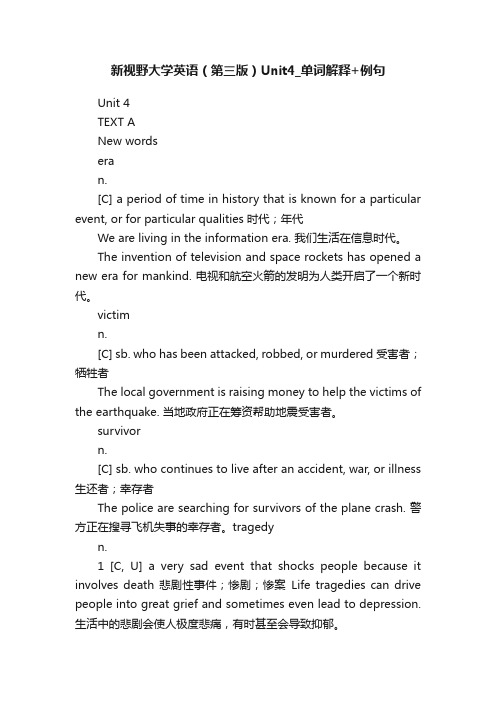
新视野大学英语(第三版)Unit4_单词解释+例句Unit 4TEXT ANew wordseran.[C] a period of time in history that is known for a particular event, or for particular qualities 时代;年代We are living in the information era. 我们生活在信息时代。
The invention of television and space rockets has opened a new era for mankind. 电视和航空火箭的发明为人类开启了一个新时代。
victimn.[C] sb. who has been attacked, robbed, or murdered 受害者;牺牲者The local government is raising money to help the victims of the earthquake. 当地政府正在筹资帮助地震受害者。
survivorn.[C] sb. who continues to live after an accident, war, or illness 生还者;幸存者The police are searching for survivors of the plane crash. 警方正在搜寻飞机失事的幸存者。
tragedyn.1 [C, U] a very sad event that shocks people because it involves death 悲剧性事件;惨剧;惨案Life tragedies can drive people into great grief and sometimes even lead to depression. 生活中的悲剧会使人极度悲痛,有时甚至会导致抑郁。
新视野大学英语四unit4教案
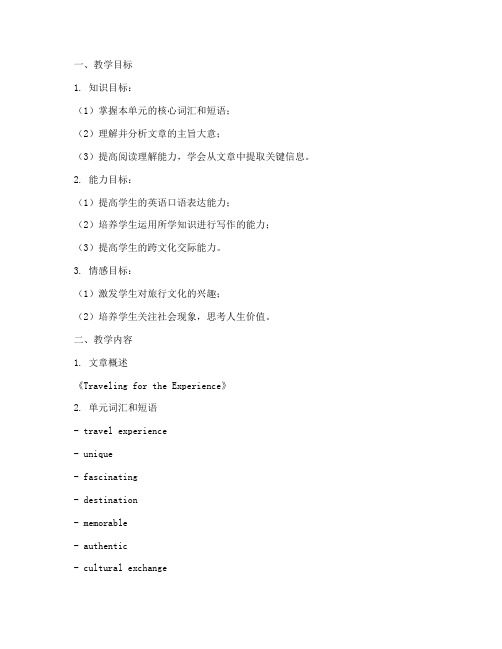
一、教学目标1. 知识目标:(1)掌握本单元的核心词汇和短语;(2)理解并分析文章的主旨大意;(3)提高阅读理解能力,学会从文章中提取关键信息。
2. 能力目标:(1)提高学生的英语口语表达能力;(2)培养学生运用所学知识进行写作的能力;(3)提高学生的跨文化交际能力。
3. 情感目标:(1)激发学生对旅行文化的兴趣;(2)培养学生关注社会现象,思考人生价值。
二、教学内容1. 文章概述《Traveling for the Experience》2. 单元词汇和短语- travel experience- unique- fascinating- destination- memorable- authentic- cultural exchange- fulfill- indispensable- unconventional3. 写作技能- 描述旅行经历- 表达个人观点- 举例说明三、教学过程1. 导入(1)通过提问,引导学生思考旅行的意义;(2)播放一段旅行视频,激发学生对旅行的兴趣。
2. 阅读理解(1)让学生快速阅读文章,了解文章大意;(2)引导学生分析文章结构,找出文章的主旨大意;(3)讲解文章中的重点词汇和短语,如travel experience、unique、fascinating等;(4)让学生回答问题,检验阅读效果。
3. 口语练习(1)分组讨论,让学生分享自己的旅行经历;(2)设置情景,让学生模拟旅行中的对话,如询问景点、介绍文化等;(3)教师点评,纠正学生的发音和语法错误。
4. 写作训练(1)布置写作任务,要求学生描述自己的旅行经历;(2)讲解写作技巧,如开头、结尾、过渡等;(3)学生完成写作,教师批改并点评。
5. 总结(1)回顾本单元所学内容,总结旅行的重要性;(2)鼓励学生在生活中多关注旅行文化,提高自己的综合素质。
四、教学评价1. 阅读理解:通过课堂提问和课后作业,检验学生对文章内容的掌握程度。
英语读写教程-Unit-4-词汇详解
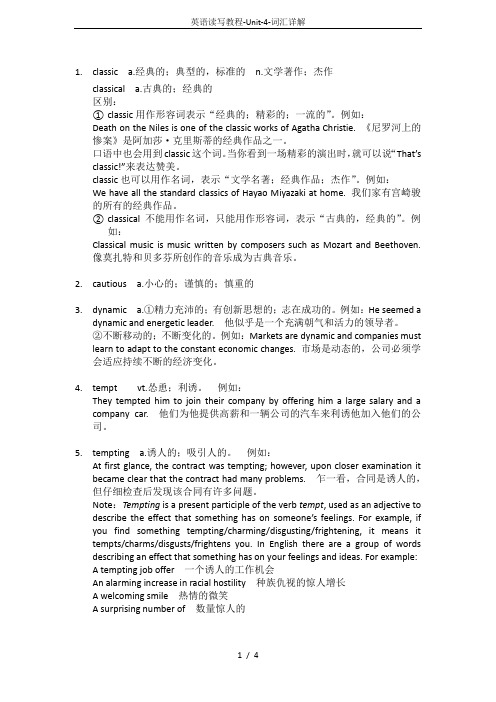
1.classic a.经典的;典型的,标准的n.文学著作;杰作classical a.古典的;经典的区别:①classic用作形容词表示“经典的;精彩的;一流的”。
例如:Death on the Niles is one of the classic works of Agatha Christie. 《尼罗河上的惨案》是阿加莎·克里斯蒂的经典作品之一。
口语中也会用到classic这个词。
当你看到一场精彩的演出时,就可以说“That’s classic!”来表达赞美。
classic也可以用作名词,表示“文学名著;经典作品;杰作”。
例如:We have all the standard classics of Hayao Miyazaki at home. 我们家有宫崎骏的所有的经典作品。
②classical不能用作名词,只能用作形容词,表示“古典的,经典的”。
例如:Classical music is music written by composers such as Mozart and Beethoven.像莫扎特和贝多芬所创作的音乐成为古典音乐。
2.cautious a.小心的;谨慎的;慎重的3.dynamic a.①精力充沛的;有创新思想的;志在成功的。
例如:He seemed adynamic and energetic leader. 他似乎是一个充满朝气和活力的领导者。
②不断移动的;不断变化的。
例如:Markets are dynamic and companies mustlearn to adapt to the constant economic changes. 市场是动态的,公司必须学会适应持续不断的经济变化。
4.tempt vt.怂恿;利诱。
例如:They tempted him to join their company by offering him a large salary and a company car. 他们为他提供高薪和一辆公司的汽车来利诱他加入他们的公司。
高一英语(牛津)-Unit4-知识点梳理
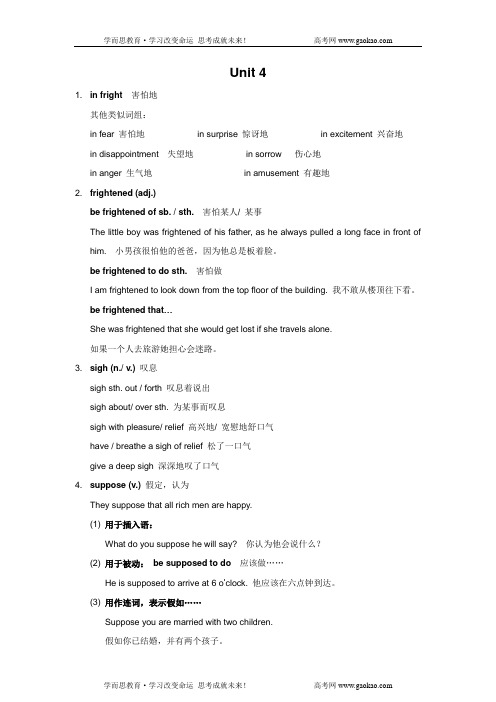
Unit 41. in fright 害怕地其他类似词组:in fear 害怕地in surprise 惊讶地in excitement 兴奋地in disappointment 失望地in sorrow 伤心地in anger 生气地in amusement 有趣地2. frightened(adj.)be frightened of sb. / sth.害怕某人/ 某事The little boy was frightened of his father, as he always pulled a long face in front of him. 小男孩很怕他的爸爸,因为他总是板着脸。
be frightened to do sth. 害怕做I am frightened to look down from the top floor of the building. 我不敢从楼顶往下看。
be frightened that…She was frightened that she would get lost if she travels alone.如果一个人去旅游她担心会迷路。
3. sigh (n./ v.) 叹息sigh sth. out / forth 叹息着说出sigh about/ over sth. 为某事而叹息sigh with pleasure/ relief 高兴地/ 宽慰地舒口气have / breathe a sigh of relief 松了一口气give a deep sigh 深深地叹了口气4. suppose (v.) 假定,认为They suppose that all rich men are happy.(1) 用于插入语:What do you suppose he will say? 你认为他会说什么?(2) 用于被动:be supposed to do 应该做……He is supposed to arrive at 6 o’clock. 他应该在六点钟到达。
英语人教版九年级全册Unit 4
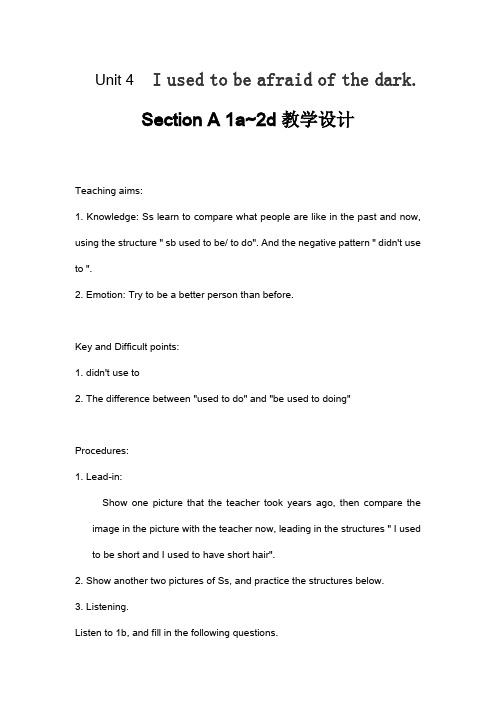
Unit 4I used to be afraid of the dark.Section A 1a~2d教学设计Teaching aims:1. Knowledge: Ss learn to compare what people are like in the past and now, using the structure " sb used to be/ to do". And the negative pattern " didn't use to ".2. Emotion: Try to be a better person than before.Key and Difficult points:1. didn't use to2. The difference between "used to do" and "be used to doing"Procedures:1. Lead-in:Show one picture that the teacher took years ago, then compare the image in the picture with the teacher now, leading in the structures " I used to be short and I used to have short hair".2. Show another two pictures of Ss, and practice the structures below.3. Listening.Listen to 1b, and fill in the following questions.a. Mario used to be ______ . He used to wear _______.b. Amy used to be ______. She used to have _____ hair.c. Tina used to have _____ and _____ hair.4. Read after the tape and imitate the tones and pronunciations.5. Listen to 2a and check the words you hear.______ friendly ______ outgoing ______ serious______ humorous ______ silent ______active_____ brave ______ quiet ______ helpful6. Listen again and complete the blanks about how Paula has changed.a. Paula used to be really ______ . She was always silent in class. She wasn'tvery ______. She was never brave enough to ask questions. But now she's more interested in ______. She plays ______ almost every day. She's also on a ______ team.b. She got good grades in ______. She was also good in ______. She used toplay the piano. And now she still plays the ______ from time to time.7. Skim. Read and answer the following questions.a. When did they see each other for the last time?b. What was Billy like in the past?8. Role-play the conversation in pairs or groups.Exercises:1. I used to like pop music. (改为一般疑问句)______ you ______ to like pop music.2. You used to be silent. (完成附加问句)You used to be silent, ______ ______?3. There was a school in this village before. (改为同义句)There ______ ______ ______ a school in this village.4. She used to be humorous.(对划线部分提问)______ ______ she use to ______?5. My grandfather used to take a walk after dinner.(对划线部分提问) ______ ______ your grandfather use to ______ after dinner?。
八年级上册英语书unit4单词
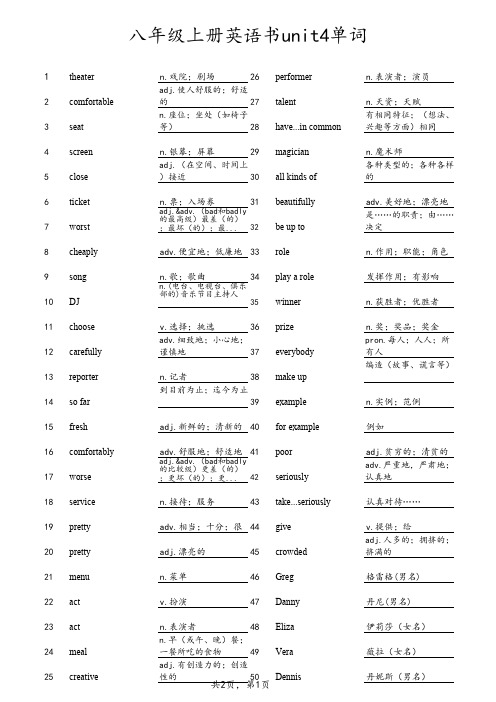
八年级上册英语书unit4单词1theater n.戏院;剧场26performer n.表演者;演员2comfortable adj.使人舒服的;舒适的27talent n.天资;天赋3seat n.座位;坐处(如椅子等)28have...in common有相同特征;(想法、兴趣等方面)相同4screen n.银幕;屏幕29magician n.魔术师5close adj.(在空间、时间上)接近30all kinds of各种类型的;各种各样的6ticket n.票;入场券31beautifully adv.美好地;漂亮地7worst adj.&adv.(bad和badly的最高级)最差(的);最坏(的);最...32be up to是……的职责;由……决定8cheaply adv.便宜地;低廉地33role n.作用;职能;角色9song n.歌;歌曲34play a role发挥作用;有影响10DJ n.(电台、电视台、俱乐部的)音乐节目主持人35winner n.获胜者;优胜者11choose v.选择;挑选36prize n.奖;奖品;奖金12carefully adv.细致地;小心地;谨慎地37everybodypron.每人;人人;所有人13reporter n.记者38make up编造(故事、谎言等)14so far 到目前为止;迄今为止39example n.实例;范例15fresh adj.新鲜的;清新的40for example例如16comfortably adv.舒服地;舒适地41poor adj.贫穷的;清贫的17worse adj.&adv.(bad和badly的比较级)更差(的);更坏(的);更...42seriouslyadv.严重地,严肃地;认真地18service n.接待;服务43take...seriously认真对待……19pretty adv.相当;十分;很44give v.提供;给20pretty adj.漂亮的45crowded adj.人多的;拥挤的;挤满的21menu n.菜单46Greg格雷格(男名) 22act v.扮演47Danny丹尼(男名)23act n.表演者48Eliza伊莉莎(女名)24meal n.早(或午、晚)餐;一餐所吃的食物49Vera薇拉(女名)25creative adj.有创造力的;创造性的50Dennis丹妮斯(男名)共2页,第1页51American Idol 美国偶像(文中为电视节目名称)53China's Got Talent中国达人秀(文中为电视节目名称)52America's Got Talent 美国达人秀(文中为电视节目名称)54共2页,第2页。
七上英语unti4知识点

七上英语unti4知识点
Unit 4的知识点包括但不限于:
1. 词汇:包括名词(如backpack、book、pencil等)、形容词(如old、new、big等)、动词(如have、need、find等)和介词(如in、on、under等)。
2. 语法:一般现在时的使用,包括主语+动词原形的结构,以及疑问句和肯定句的变换。
指示代词this和that的使用也是重要的知识点。
3. 物品位置的描述:可以使用where引导的疑问句来询问物品的位置,以
及介词on表示物品在某物的上面。
4. 动词的用法:take表示从近处带到远处,而bring表示从远处带到近处。
5. some和any的使用:some一般用于肯定句,any用于否定句和疑问句。
在表示请求、建议、征求意见等委婉语气的疑问句中,用some而不用any。
6. 名词所有格:在英语中,表达“我的”、“你的”、“他的”时,可以使用代词my、your、his等。
7. 其他语法点:比如指示代词these和those的使用。
this用于指离说话
者近的人、物,that用于指离说话者远的人、物;同时,在表达“我的”、“你的”、“他的”时,也可以使用名词所有格形式,如my backpack、your book、his pencil等。
以上内容仅供参考,建议查阅七年级英语课本或咨询英语老师,获取更准确的信息。
人教版七上英语第四单元讲解
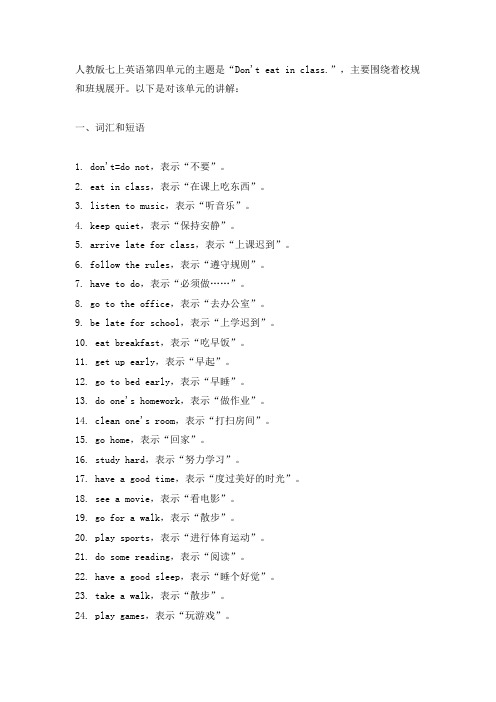
人教版七上英语第四单元的主题是“Don't eat in class.”,主要围绕着校规和班规展开。
以下是对该单元的讲解:一、词汇和短语1. don't=do not,表示“不要”。
2. eat in class,表示“在课上吃东西”。
3. listen to music,表示“听音乐”。
4. keep quiet,表示“保持安静”。
5. arrive late for class,表示“上课迟到”。
6. follow the rules,表示“遵守规则”。
7. have to do,表示“必须做……”。
8. go to the office,表示“去办公室”。
9. be late for school,表示“上学迟到”。
10. eat breakfast,表示“吃早饭”。
11. get up early,表示“早起”。
12. go to bed early,表示“早睡”。
13. do one's homework,表示“做作业”。
14. clean one's room,表示“打扫房间”。
15. go home,表示“回家”。
16. study hard,表示“努力学习”。
17. have a good time,表示“度过美好的时光”。
18. see a movie,表示“看电影”。
19. go for a walk,表示“散步”。
20. play sports,表示“进行体育运动”。
21. do some reading,表示“阅读”。
22. have a good sleep,表示“睡个好觉”。
23. take a walk,表示“散步”。
24. play games,表示“玩游戏”。
25. watch TV,表示“看电视”。
26. listen to music,表示“听音乐”。
27. eat dinner,表示“吃晚饭”。
28. get to school,表示“到学校”。
仁爱版七年级英语上册unit4知识点
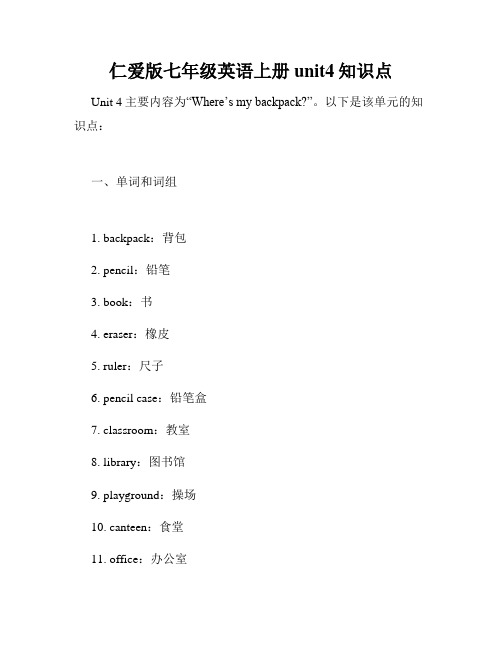
仁爱版七年级英语上册unit4知识点Unit 4主要内容为“Where’s my backpack?”。
以下是该单元的知识点:一、单词和词组1. backpack:背包2. pencil:铅笔3. book:书4. eraser:橡皮5. ruler:尺子6. pencil case:铅笔盒7. classroom:教室8. library:图书馆9. playground:操场10. canteen:食堂11. office:办公室12. restroom:卫生间13. go straight:直走14. turn left/right:向左/右拐15. on the left/right:在左/右边二、句型和语法1. Where’s my backpack?:我的背包在哪里?2. It’s in the classroom.:它在教室里。
3. Where’s my pencil case?:我的铅笔盒在哪里?4. It’s on the desk.:它在桌子上。
5. Where’s the restroom?:卫生间在哪里?6. It’s next to the library.:它在图书馆旁边。
7. Excuse me, where’s the canteen?:请问,食堂在哪里?8. Go straight and turn left.:直走然后向左拐。
9. Where’s the office?:办公室在哪里?10. It’s across from the restroom.:它在卫生间对面。
三、重点词汇解析1. classroom:教室- class:课程,班级- room:房间2. library:图书馆- libr:图书- -ary:表“地方”的后缀3. playground:操场- play:玩,游戏- ground:地面,场地4. canteen:食堂- can:罐头- teen:叫号后缀四、话题练习根据上述知识点,练习以下话题:A. 对话练习1. A: Excuse me, where’s the restroom? B: It’s next to the library.2. A: Where’s my backpack?B: It’s in the classroom.3. A: Where’s the office?B: It’s across from the restroom.4. A: Excuse me, where’s the canteen? B: Go straight and turn left.B. 句型转换1. I am next to the library.: Where am I?2. It’s in the pencil case.: Where’s the eraser?3. He’s in the classroom.: Where’s she?4. They’re on the playground.: Where are we?5. Go straight and turn right.: How can I get to the office?C. 阅读练习My ClassroomHi, my name is Lily. This is my classroom. The backpack is on the desk. The pencil case is under the chair. The book is on the shelf. The eraser is in the pencil case. The ruler is on the desk. I love my classroom.1. Who is talking about the classroom?2. Where is the backpack?3. Where’s the pencil case?4. Where’s the book?5. Is the eraser on the desk?总结:仁爱版七年级英语上册unit4知识点主要涉及单词和词组、句型和语法、重点词汇解析等方面。
高中英语-unit4+words - 副本
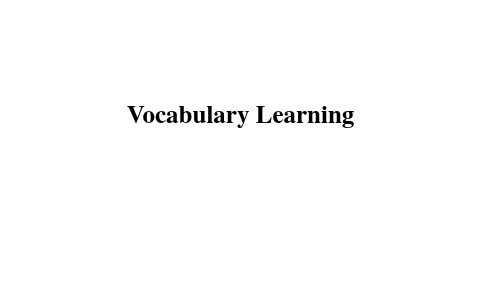
A journalist's job involves __________ (interview) people while a photographer's job involves ____________(photograph) the interviewees.
inform sb. of /about sth. /that....告知某人某事
Surfing the Internet can keep usi_n_fo_r_m__e_d(inform) of the most up-to-date news .
keep sb. informed (of) 随时通知某人...
The famous movie star, Fan Bingbing, was involved_____ tax evasion.
1. Michelle found a job as a high school teacher which involves ________(spend) quite a lot of time with students.
Saving the girl's life was an ______ thing for him. They always looked at him with_________.
6. assist
帮助某人某事
_a_s_s_is_t__s_b_.__w__it_h__s_t_h_.__
帮助某人做某事
an amateur photographer
a professional photographer
新标准大学英语四UNIT4 ppt课件
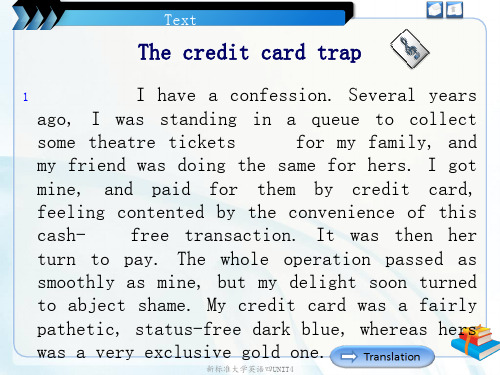
charge them more interest, and earn more
money. That's the way they do business.
新标准大学英语四UNIT4
Text
8
So does this explain why the credit
card companies are luring impoverished
新标准大学英语四UNIT4
Text
2
How did she do this? How
could this be? I knew I earned more than her,
my car was newer, and my house was smarter.
How did she get to appear more flash than me?
naturally her credi大学英语四UNIT4
Text
17
And not
surprisingly,
she couldn't
pay off
even
the minimum
payment on her credit
charardges obwilinlg., butSaolso credit card debts and interest.
then who didn't? I paid off all my credit
debt at the end of the month, so although
technically, I was in debt to the credit card
company, it was only for a matter of a few
人教版八下英语第四单元Unit 4知识点归纳
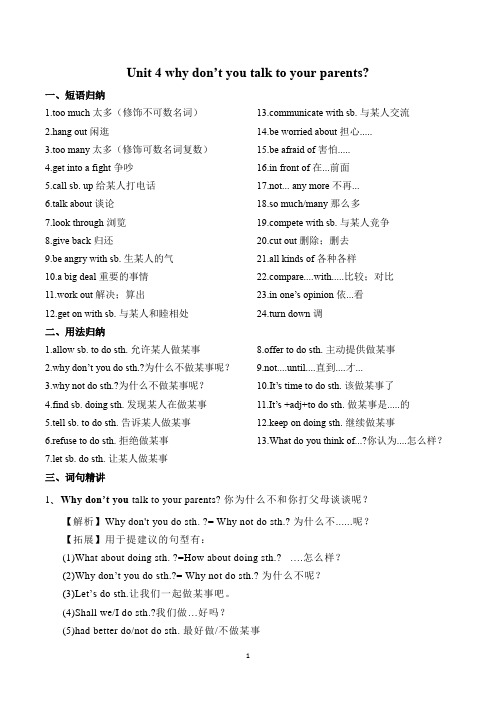
Unit4why don’t you talk to your parents?一、短语归纳1.too much太多(修饰不可数名词)2.hang out闲逛3.too many太多(修饰可数名词复数)4.get into a fight争吵5.call sb.up给某人打电话6.talk about谈论7.look through浏览8.give back归还9.be angry with sb.生某人的气10.a big deal重要的事情11.work out解决;算出12.get on with sb.与某人和睦相处municate with sb.与某人交流14.be worried about担心.....15.be afraid of害怕.....16.in front of在...前面17.not...any more不再...18.so much/many那么多pete with sb.与某人竞争20.cut out删除;删去21.all kinds of各种各样pare....with.....比较;对比23.in one’s opinion依...看24.turn down调二、用法归纳1.allow sb.to do sth.允许某人做某事2.why don’t you do sth.?为什么不做某事呢?3.why not do sth.?为什么不做某事呢?4.find sb.doing sth.发现某人在做某事5.tell sb.to do sth.告诉某人做某事6.refuse to do sth.拒绝做某事7.let sb.do sth.让某人做某事8.offer to do sth.主动提供做某事9.not....until....直到....才...10.It’s time to do sth.该做某事了11.It’s+adj+to do sth.做某事是.....的12.keep on doing sth.继续做某事13.What do you think of...?你认为....怎么样?三、词句精讲1、Why don’t you talk to your parents? 你为什么不和你打父母谈谈呢?【解析】Why don't you do sth. ?= Why not do sth.? 为什么不......呢?【拓展】用于提建议的句型有:(1)What about doing sth. ?=How about doing sth.? ….怎么样?(2)Why don’t you do sth.?= Why not do sth.? 为什么不呢?(3)Let’s do sth.让我们一起做某事吧。
unit4九年级上册英语知识点

unit4九年级上册英语知识点Unit 4 九年级上册英语知识点导语:九年级上册英语Unit 4涵盖了一些重要的语法和词汇知识点。
本文将介绍这些知识点,并提供一些有趣的例句和练习,帮助同学们更好地掌握。
一、一般现在时1. 用法:表示经常性或习惯性的动作或状态。
例句:I usually go to school by bus.He plays basketball every Sunday.2. 注意事项:第三人称单数的一般现在时动词要加-s或-es结尾。
例句:She loves singing.He often takes a walk after dinner.二、一般过去时1. 用法:表示在过去某个时间发生的动作或存在的状态。
例句:We visited the museum yesterday.I lived in France for three years.2. 注意事项:一般过去时的肯定句句子结构为“主语+动词的过去式”,否定句和疑问句使用助动词did。
例句:She didn't go to the party last night.Did you watch the movie last weekend?三、情态动词can和could1. 用法:表示能力、允许、请求、建议等意义。
例句:I can swim very well.Could you please open the window?2. 注意事项:can表示现在的能力或允许,could表示过去的能力或允许,也可以表示提出请求或建议。
例句:When I was young, I could run faster.Could you please lend me a pencil?四、现在进行时1. 用法:表示现在(讲话瞬间)正在进行的动作或发生的事情。
例句:She is reading a book right now.They are watching a movie at the cinema.2. 注意事项:现在进行时句子结构为“主语+be动词(am, is, are)+动词的现在分词”。
人教版高一英语必修一unit4 课文翻译和知识点详解
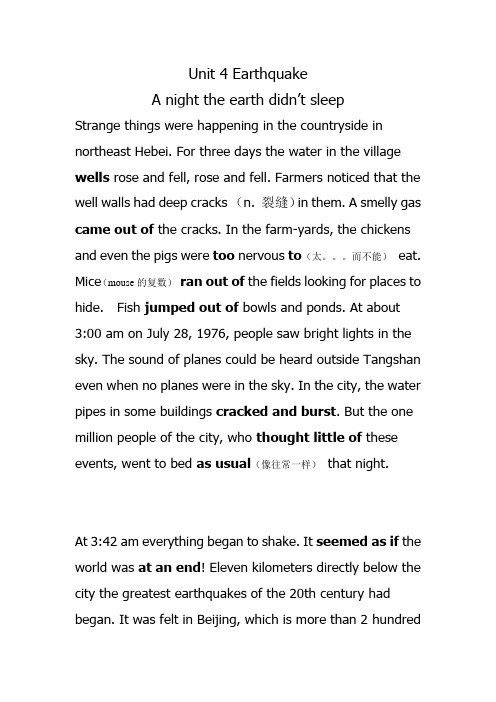
Unit 4 EarthquakeA night the earth didn’t sleepStrange things were happening in the countryside in northeast Hebei. For three days the water in the village wells rose and fell, rose and fell. Farmers noticed that the well walls had deep cracks (n. 裂缝)in them. A smelly gas came out of the cracks. In the farm-yards, the chickens and even the pigs were too nervous to(太。
而不能)eat. Mice(mouse的复数)ran out of the fields looking for places to hide. Fish jumped out of bowls and ponds. At about 3:00 am on July 28, 1976, people saw bright lights in the sky. The sound of planes could be heard outside Tangshan even when no planes were in the sky. In the city, the water pipes in some buildings cracked and burst. But the one million people of the city, who thought little of these events, went to bed as usual(像往常一样)that night.At 3:42 am everything began to shake. It seemed as if the world was at an end! Eleven kilometers directly below the city the greatest earthquakes of the 20th century had began. It was felt in Beijing, which is more than 2 hundredkilometers away. One - third of the nation felt it. A huge crack that was eight kilometers long and thirty meters wide cut across houses, roads and canals. Steam burst from holes in the ground. Hard hills of rock became rivers of dirt. In fifteen terrible seconds a large city lay in ruins. The suffering of the people was extreme. Two-thirds of them died or were injured during the earthquake. Thousands of families were killed and many children were left without parents. The number of people who were killed or seriously injured reached more than 400,000.But how could the survivors believe it was natural? Everywhere they looked nearly everything was destroyed. All of the city’s hospitals, 75% of its factories and buildings and 90% of its homes were gone. Bricks covered the ground like red autumn leaves. No wind, however, could blow them away. Two dams fell and most of the bridges also fell or were not safe for traveling. The railway tracks were now useless piece of steel. Tens of thousands of cows would never give milk again. Half a million pigs and millions of chickens were dead. Sand now filled the wells instead of(代替,取代) water. People were shocked. Then,later that afternoon, another big quake shook Tangshan. Some of the rescue workers and doctors were trapped under the ruins. More buildings fell down. Water, food, and electricity were hard to get. People began to wonder how long the disaster would last(宾语从句).All hope was not lost. Soon after the quakes, the army sent 150,000 soldiers to Tangshan to help rescue workers. Hundreds of thousands of people were helped.The army organized teams to dig out those who were trapped to bury the dead. To the north of the city, most of the 10,000 miners were rescued from the coal mines there. Workers built shelters for survivors whose homes had been destroyed. Fresh water was taken to the city by train, truck and plane. Slowly, the city began to breathe again.词汇:1.飓风hurricane 龙卷风tornado台风typhoon 干旱drought2.警报alarm 潮湿的humid 湿气humidity 现象phenomenon3.摇;震动shake 爆炸burst 废墟ruin损害injure4.破坏destroy 无用的useless 使震惊shock 地震quake/earthquake5.救援rescue 灾难disaster短语:1.雷电交加thunder and lightning 温室效应weather forcast2.全球变暖global warming 立刻,马上right away3.平静下来calm down 爆发burst out4.突然burst into 废墟in ruins5.挖掘dug out 分发,发出give out6.为。
人教版九年级英语第四单元 Unit 4 Section A 知识点精讲
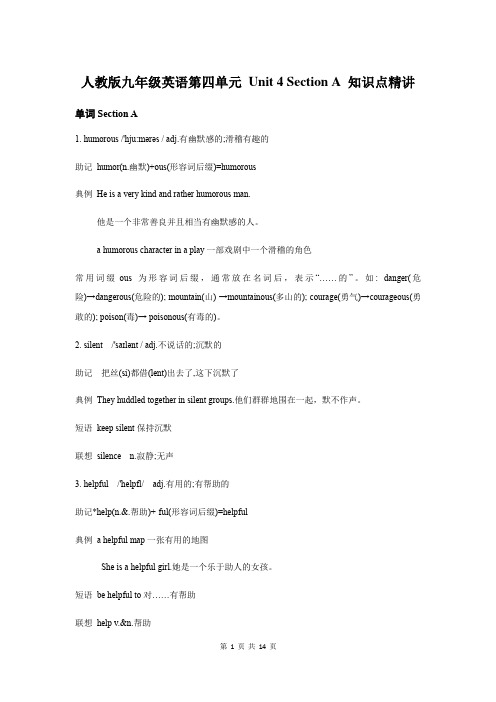
人教版九年级英语第四单元Unit 4 Section A 知识点精讲单词Section A1. humorous /'hju:mərəs / adj.有幽默感的;滑稽有趣的助记humor(n.幽默)+ous(形容词后缀)=humorous典例He is a very kind and rather humorous man.他是一个非常善良并且相当有幽默感的人。
a humorous character in a play一部戏剧中一个滑稽的角色常用词缀-ous为形容词后缀,通常放在名词后,表示“……的”。
如: danger(危险)→dangerous(危险的); mountain(山) →mountainous(多山的); courage(勇气)→courageous(勇敢的); poison(毒)→ poisonous(有毒的)。
2. silent /'saɪlənt / adj.不说话的;沉默的助记把丝(si)都借(lent)出去了,这下沉默了典例They huddled together in silent groups.他们群群地围在一起,默不作声。
短语keep silent保持沉默联想silence n.寂静;无声3. helpful /'helpfl/ adj.有用的;有帮助的助记*help(n.&.帮助)+-ful(形容词后缀)=helpful典例a helpful map一张有用的地图She is a helpful girl.她是一个乐于助人的女孩。
短语be helpful to对……有帮助联想help v.&n.帮助常用词缀形容词后缀-ful通常位于既可用作动词也可用作名词的单词后,常见的词有use→ useful(有用的); thank→ thankful(感激的);care→ careful(细心的)等。
4. score /skɔː(r)/ n.&v.得分;进球助记sore(疼痛的)中间加个c,得分/进球光疼是不够的。
人教版选修一英语课文unit4
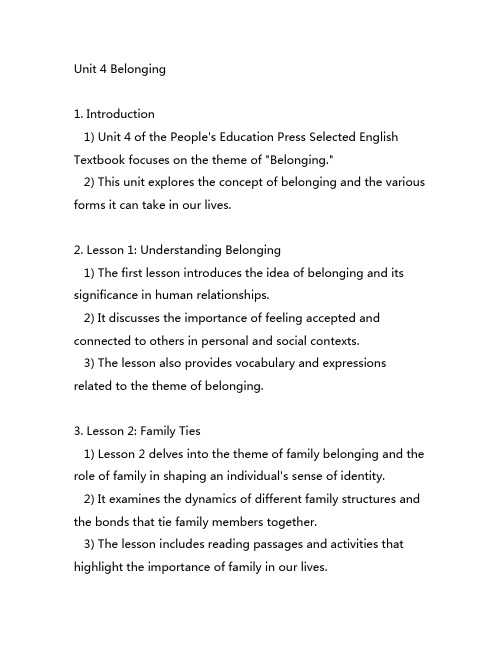
Unit 4 Belonging1. Introduction1) Unit 4 of the People's Education Press Selected English Textbook focuses on the theme of "Belonging."2) This unit explores the concept of belonging and the various forms it can take in our lives.2. Lesson 1: Understanding Belonging1) The first lesson introduces the idea of belonging and its significance in human relationships.2) It discusses the importance of feeling accepted and connected to others in personal and social contexts.3) The lesson also provides vocabulary and expressions related to the theme of belonging.3. Lesson 2: Family Ties1) Lesson 2 delves into the theme of family belonging and the role of family in shaping an individual's sense of identity.2) It examines the dynamics of different family structures and the bonds that tie family members together.3) The lesson includes reading passages and activities that highlight the importance of family in our lives.4. Lesson 3: Friendship and Community1) This lesson focuses on the broader concept of belonging within friendship circles andmunities.2) It explores the characteristics of healthy friendships and the benefits of being part of a supportivemunity.3) The lesson encourages students to reflect on their own experiences of friendship andmunity belonging.5. Lesson 4: Finding Your Place1) The final lesson in Unit 4 addresses the theme of finding one's place in the world.2) It discusses the challenges and rewards of seeking a sense of belonging in society and the importance of self-acceptance.3) The lesson provides opportunities for students to share their thoughts and experiences on the topic.6. Conclusion1) Unit 4 of the People's Education Press Selected English Textbook offers aprehensive exploration of the theme of belonging.2) Through engaging lessons and activities, students have the opportunity to deepen their understanding of the concept andits relevance to their own lives.3) By examining belonging within family, friendships, and the broadermunity, students can g本人n valuable insights into the dynamics of human relationships.In conclusion, Unit 4 of the People's Education Press Selected English Textbook provides students with a thought-provoking study of the theme of belonging. By examining the intricacies of family ties, friendships, andmunity belonging, students are able to develop a deeper understanding of the social and emotional implications of belonging. Thisprehensive exploration serves to enrich students' language skills while also fostering a greater appreciation for the role of belonging in their lives. As students engage with the material in this unit, they are encouraged to reflect on their own experiences and perspectives, ultimately leading to a more profound and meaningful learning experience. The incorporation of relevant vocabulary and expressions further enhances students' ability to articulate their understanding of belonging, thereby strengthening theirmunicativepetence in English. Overall, Unit 4 offers a valuable contribution to students' language learning journey by offering a rich and insightful study of an essential aspect of human experience.。
鲁科版四上 Unit 4-try yourself
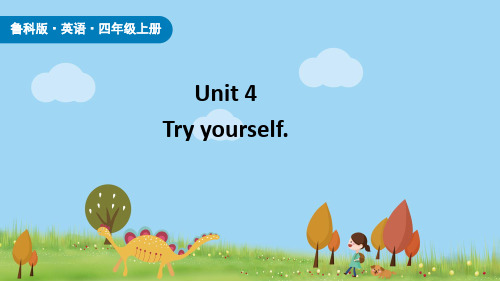
Learn to learn
Practice
选出不同类的单词。
( A)1. A. season B. summer
( B )2. A. cool
B. coat
(C)3. A. fly
B. swim
(C)4. A. sweater B. jacket
(B)5. A. hot
B. winter
C. autumn C. cold C. warm C. wear C. warm
英汉短语互译。
1.在春天 ___i_n_s_p_ri_n_g__ 2. go swimming___去_游__泳____ 3.放风筝__f_l_y_a_k_i_te____ 4. what about…_…__…_怎__么__样__ 5.穿T恤衫_w_e_a_r_a_T__-s_h_ir_t_
单项选择。 1. I don’t like___A____. It's cold. A. winter B. spring C. summer
— What season is it? — It’s __w_i_n_te_r__.
2. 描述季节特征的句型: It’s+表示天气状况的形容词+in+季节(+其他).
It’s cold in winter.
It’s hot in summer.
It’s __________.
3. 描述人物的穿着的句型: We often wear...
2. 复习句型: (1) 询问是什么季节的句型: — What season is it? — It’s+季节.
2. 复习句型: (2) 描述季节特征的句型: It’s+表示天气状况的形容词+in+季节 (+其他). (3) 描述人物的穿着的句型: We often wear...
- 1、下载文档前请自行甄别文档内容的完整性,平台不提供额外的编辑、内容补充、找答案等附加服务。
- 2、"仅部分预览"的文档,不可在线预览部分如存在完整性等问题,可反馈申请退款(可完整预览的文档不适用该条件!)。
- 3、如文档侵犯您的权益,请联系客服反馈,我们会尽快为您处理(人工客服工作时间:9:00-18:30)。
Reading Focus – Language Point 1. Immersing myself in a book or a lengthy article used to be easy. My mind would get caught up in the narrative or the turns of the argument, and I’d spend hours strolling through long stretches of prose. (Para. 1) Here, the author is talking about his past experience. For example, he used to be easily absorbed in a book or a long article. His attention would also be drawn to the narrative, complex arguments and long prose.
高等院校研究生英语系列教材
综合教程(下)
INTEGRATED COURSE
Unit 4
Science and Technology
2
Content
Starting out Reading Focus Reading More Practical Translation Focused Writing Final Project
Complete the following extract with information from the text.
uncomfortable Over the past few years, I’ve had an 1) _____________ feeling that I’m not thinking the way I used to think, particularly when I am 2) ________. reading In the past, I would be able to 3) immerse ________ myself in lengthy articles. But, it is a different story now. It has become an exacting thing for me to do some 4) _______ deep reading. This, I think, can be attributed to a universal medium – the Net, which provides immediate 5) ________ access to such an incredibly rich store of information. Reliance on the Net leads to the gradual loss of my capacity for 6) _____________ concentration and contemplation. Similar troubles with reading also fall upon other people,
Reading Focus
Is Google Making Us Stupid?
Background Information
Watch a short video then 1) find out about people’s ideas about what Google has done from different angles and 2) fill in the following paragraph with the information you’ve got from the video. Six simple letters on a plain white page – that’s the face of the most powerful technology company in the world, revered, ___________________________________ envied, and sometimes scorned. Google’s cofounders Sergey Brin and Larry Page started the company as grad students _________. in 1998 It has astonishingly rich Today they stand atop an empire cast made them ________________. in their own image, __________, ___________. audacious ambitious, and often controversial It is a company like no other, ________ thriving on long hours, too much coffee, and something quite elusive – genius.
Reading Focus—Critical Thinking
Discuss in groups the following questions
People can gain easy access to virtually all the information on the Internet, including e-books, which acts as a catalyst for the debate as to whether to abandon or strengthen the copyright of books. In your opinion, how should the issue of copyright be dealt with?
Reading Focus – Detailed Information
Task 2 Choose the sentence that best expresses the meaning of the sentence from the text. (P103)
Key: 1 D 2 A 5 D Understanding
As a consequence, our ability to interpret and make rich mental connections remains tremendously 12)disengaged _______. Another good case in point, illustrating the point that 13) ___________ variations extend across many regions of the brain when we apply different media, is Friedrich Nietzsche. When his vision was failing and it was tough for him to keep his eyes focused on a page, he bought a typewriter, with which 14) _________ words could once again flow from his mind to the page. But, as one of Nietzsche’s friends claimed, it made Nietzsche’s terse prose even 15) ____________ and more telegraphic. tighter
Reading Focus – Global Understanding
including Scott Karp, who recently confessed that he has stopped reading books altogether, and Bruce 7) ________ altered Friedman, who claimed that the Internet has 8) _______ his mental habits. A recently published study of online research habits also change in the way we read and think. points to the 9) _______ Although the Internet and text-messaging on cell phones different kind of reading. facilitate our reading, it’s a 10) ________ According to Maryanne Wolf, a developmental psychologist at Tufts University, we tend to become ―mere 11) _________ decoders of information‖ while reading online.
1. ―We are not only what we read,‖ says Maryanne Wolf. ―We are how we read.‖ 2. When we read online, she says, we tend to become ―mere decoders of information.‖
Reading Focus—Critical Thinking
Read the following sentences or questions and discuss with your partner whether you have the same problems and if you have, how you will cope with these problems. 1. The more they use the Web, the more they have to fight to stay focused on long pieces of writing. 2. People using the sites exhibited ―a form of skimming activity,‖ hopping from one source to another and rarely returning to any source they’d already visited. 3. ―I can’t read War and Peace anymore,‖ he admitted. ―I’ve lost the ability to do that. Even a blog post of more than three or four paragraphs is too much to absorb. I skim it.‖
